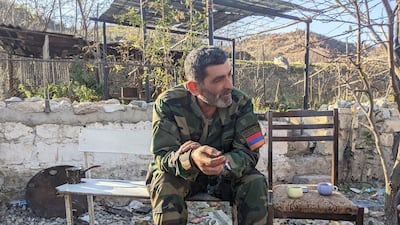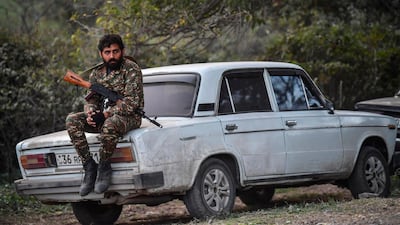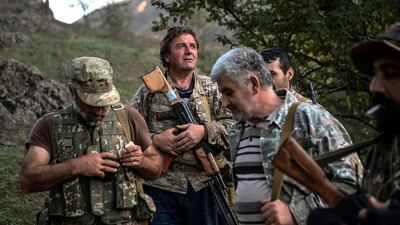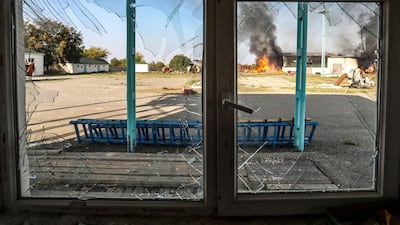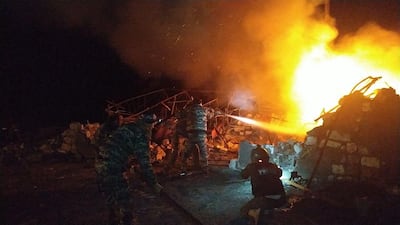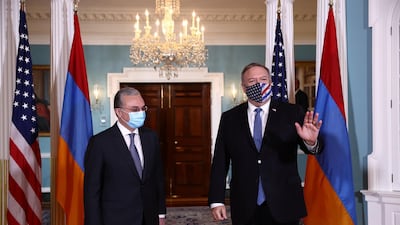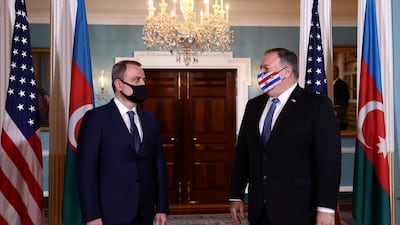"The one who enters my house should think, for what purpose is he going to die?”
Ashot Sevyan has lived in his native village of Charektar for all 49 years of his life. Now, he is preparing to die for it.
“A few days ago, a guy came here and told me, ‘get up and leave',” Mr Sevyan says. “I am going to fight instead. For my home. For my honour.”
The village is populated by ethnic Armenians – yet it is located in Kelbajar, a region of Nagorno-Karabakh to be handed over by the Armenians to Azerbaijan tomorrow as part of a November 10 peace deal signed to end the recent 44-day war between the two countries.
It is not clear how exactly the transfer will work, including when Azerbaijani forces will arrive. For Mr Sevyan, all of this is immaterial.
“I sent my wife and my daughter to Yerevan,” he said, his eyes hard and unblinking. “They don’t know what I am planning to do.”
He is one of a number of men from Charektar, many veterans of the first war – 1988-1994 – who have refused to leave and who plan to defend their homes. Others pass by as he talks, dressed in fatigues and carrying Kalashnikov rifles.
One of them, Vladimir (he does not give his last name), stops in. A retired truck driver, he does not intend to spend his remaining years in exile. “Now begins the guerilla war,” he says.
The conversation is occasionally underscored by a deep boom in the distance. Mr Sevyan says this is Azerbaijani artillery fire.
“They are in the mountains, trying to scare us,” he says, before barking a laugh. “They already took my leg. Let them try and take the rest.”
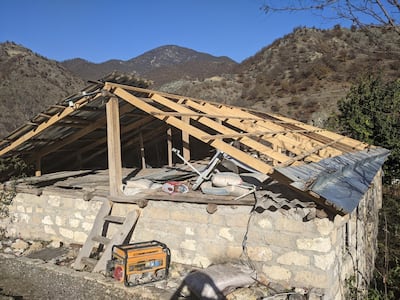
Mr Sevyan uses a prosthetic left leg, the result of an injury suffered during the 2016 Four-Day War. He is a veteran of the first conflict, from 1988 to 1994, as well.
“I fought in the first war with my father, side by side,” he says. “He was a strong man, died last year at 80.” Mr Sevyan gestures to a nearby grave. “Now [the Azerbaijanis] want to take that, too.”
Mr Sevyan is one of more than 3,000 residents of Kelbajar who will lose their homes as a result of the handover.
The ceasefire deal allows Azerbaijan to retain control of all areas it captured in the fighting, with Armenian forces handing over more territory in a series of staged withdrawals. The first such region to be transferred, Agdam, was given over to Azerbaijani troops on Friday.
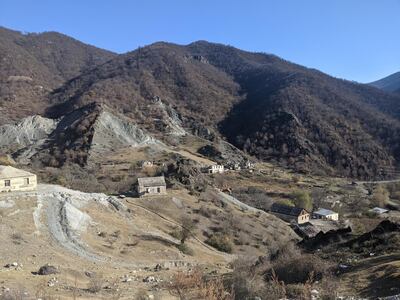
Like others, Mr Sevyan says the government has done little to help him.
“The only word they said to me was ‘leave,” he says. “Where the hell were we supposed to go? What would we do next?” Mr Sevyan says. “So many questions, and no answers.”
He is bitter at what he views as a betrayal by Armenia’s leadership.
“They didn’t even give me a chance to fight,” Mr Sevyan says, explaining that he tried to get to the front line. “It would be better to fight and die at the front than to run like a coward from here.”
“Nikol [Pashinyan] and [Ilham] Aliyev thought they would just solve this [conflict] themselves,” he says, speaking of the leaders of Armenia and Azerbaijan. “But we are not pawns. Now we are going to solve it ourselves.”
Kelbajar has become a land of ghosts over the past two weeks. Charred homes dot the landscape, burnt by their owners before departing. Power cables, metal roofs, store windows, everything transportable of value has been stripped and taken away.
Emerging evidence of Azerbaijani war crimes has hardened attitudes towards the land’s soon-to-be masters.
“How can we live with [the Azerbaijanis]?” Mr Sevyan says. “They tied a 70-year-old man’s hands behind his back and cut his ears off,” he says, referring to a video that circulated on social media last week, which shows Azerbaijani soldiers torturing an elderly Armenian captive.
Mr Sevyan is prepared for a death in combat rather than risk such a fate.
“We have seen what they do to prisoners,” he says. “All I know is that whoever walks in this door, I have 16 bullets here,” he points at his pistol, “and sixty in my Kalashnikov. I am prepared until the last drop of blood.”
Hours ahead of the handover, much is still unclear about how it will occur.
There is no clear way for Azerbaijan to access the territory – the only strip of land connecting it with Azerbaijan proper to the north is blocked by a mountain range.
Russian peacekeepers are stationed along the road and at sensitive sites (such as the Dadivank monastery), but there are too few to oversee the entire region.
Meanwhile, unidentified masked men, with no markings on their uniforms and carrying rifles, are also present in small groups on the roadside. They do not respond to questioning.
For Mr Sevyan, all is already decided.
“Now we will end this,” he says, “so that my son’s son does not have to fight side by side with his father also.”
Another boom is heard in the distance.
“You should go,” Mr Sevyan says. “It is getting dangerous.”
He smiles. “I will stay.”
